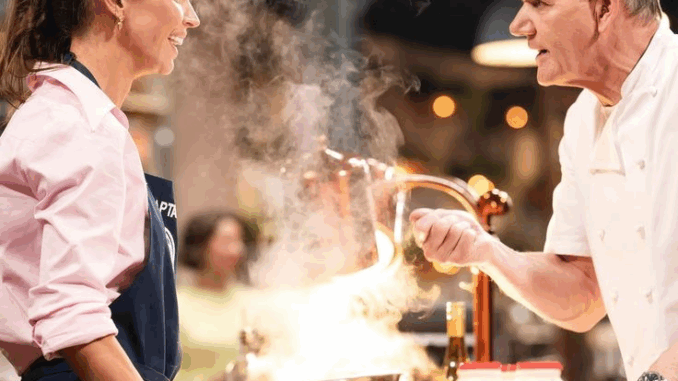
Gordon Ramsay is one of the most recognizable faces in global television. With shows like Hell’s Kitchen, Kitchen Nightmares, and MasterChef, his name has become synonymous with culinary excellence, sharp-tongued critiques, and fiery rants. But as Ramsay’s empire continues to grow, a question that once lingered in hushed tones is now echoing louder: Has his brand of brutal honesty and high-pressure drama gone too far?
At first glance, his shows appear to offer redemption— struggling restaurants saved, amateur chefs transformed, and failing kitchens revived. But behind the success stories, a darker reality simmers.
Take Kitchen Nightmares, for instance. While Ramsay’s visits often culminated in dramatic turnarounds, many of the featured restaurants eventually shuttered. A growing number of former participants have spoken out, claiming the show’s intense editing and confrontational style left long-term psychological scars. Some said they were set up to fail, portrayed worse than reality, and thrust into the spotlight unprepared for the viral backlash.
Owners who agreed to appear often expected guidance—but what they got was verbal assaults, humiliation, and public shaming. Even when Ramsay’s advice was sound, the method of delivery became the focus. Viewers cheered as he shouted expletives, smashed food into bins, and stormed out of kitchens. But what message did that send? That the only way to fix failure is through fury?
Hell’s Kitchen isn’t much different. The format encourages constant confrontation, with contestants frequently pushed to their emotional breaking points. The environment is intense by design—but critics argue it normalizes a toxic kitchen culture where shouting, belittling, and mental breakdowns are not just accepted but expected.
Some chefs who appeared on the show have since admitted to suffering from long-term anxiety, PTSD, or burnout. One former contestant anonymously revealed that the show broke their love for cooking completely, and it took years to return to a normal working kitchen without flinching at every raised voice.
And what about the impact on viewers? While Ramsay often claims his behavior is tough love with purpose, others argue it’s glorified aggression. Younger chefs, culinary students, and fans may come to believe that success in the kitchen means surviving abuse. That perfection can only be achieved by enduring humiliation. And that’s dangerous.

The wider culinary world is slowly changing. Movements for mental health in kitchens, kinder leadership, and respectful mentorship are gaining traction. But Ramsay’s older shows, with their explosive format, feel like relics of a more toxic era—one that many believe he helped create and normalize.
Even in MasterChef, where the tone is softer, there have been murmurs of manipulation. Contestants have hinted that drama is encouraged, that emotional moments are magnified for the cameras, and that the best cook doesn’t always win—just the best story.
So why does it still work?
Because it’s addictive. Watching Ramsay rage, cry, rebuild, and destroy—often in the same episode—offers a rollercoaster thrill. It feels raw. It feels real. But reality TV is never truly real. And while Ramsay remains unapologetically himself, the damage left in his wake—both on and off screen—can’t be ignored.
The truth is, Gordon Ramsay revolutionized food television. But in doing so, he may have also fueled a culture of cruelty masked as passion, entertainment at the cost of mental health, and fame built on fury.
And now, people are finally starting to ask: Was it worth it?